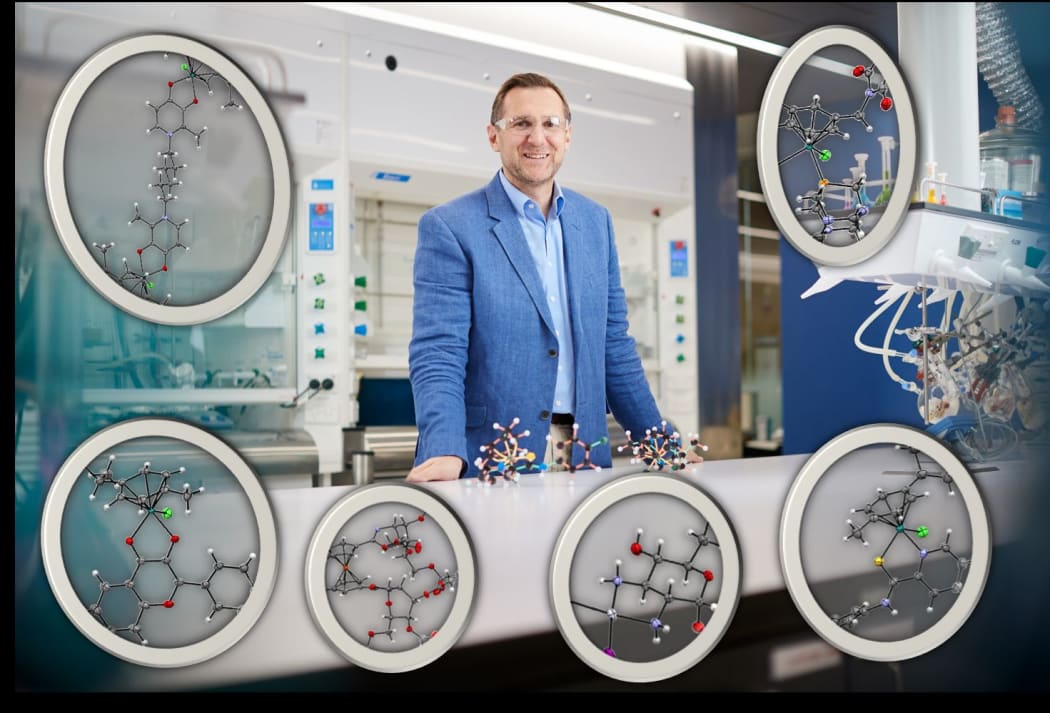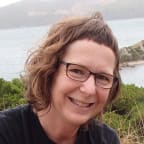The 2017 Hill Tinsley Medal has been awarded to University of Auckland chemist Christian Hartinger, who is developing anti-cancer drugs based on noble metals such as platinum and iridium.

Christian Hartinger with some of his favourite molecules. Photo: University of Auckland
Subscribe to Our Changing World for free on iTunes, Spotify, Stitcher, RadioPublic or wherever you listen to your podcasts
“We develop inorganic compounds,” says Christian. “We have metal centres in our compounds, which is quite uncommon if you look at the usual drugs you find in your local pharmacy.”
The exception, he says, is drugs for treating cancer. The first platinum-based cancer drug – cisplatin - went on the market in 1960, and Christian says that “nearly every second cancer patient who we treat with chemotherapeutics [now] would receive one of those platinum compounds.”
Christian says that metals are interesting to use in drugs because they behave differently to more standard organic compounds. Other advantages are that “it is easy to change the structure, create a lot of structural diversity, and they can undergo reactions that other compounds can’t.”
Metal-based drugs are also much more targeted on cancer cells than other chemotherapy drugs that have a broader spectrum of attack.
The metal is contained at the centre of a molecule that is created from a variety of ligands, which can be made from a wide range of molecules. This ‘packaging’ helps the drug to find and lock onto its target, enabling the metal to damage and destroy cancer tumour cells.
Christian says his lab works with platinum, ruthenium, osmium, rhodium and iridium. On the periodic table these are all part of the platinum group of noble metals. Noble metals, which also include silver, gold and palladium, are resistant to corrosion and oxidation in moist air, unlike most base metals.
He says that metals play a key role in biological processes, "so it's not surprising they have also found their way into medicine."
"There will never be one cure for cancer, because there are so many different types - but the more we learn, the more we can improve treatment."
A ruthenium-based drug that Christian helped develop is currently undergoing clinical trials.
The Hill Tinsley Award
The Hill Tinsley Medal is awarded by the New Zealand Association of Scientists (NZAS) for outstanding fundamental or applied research published by a scientist aged less than 43 years. The Beatrice Hill Tinsley Medal is named in honour of a New Zealand astronomer and cosmologist who died aged 40, at the peak of her career. It was the first science award in New Zealand to be named after a woman scientist.
The 2016 Hill Tinsley Medal was awarded to Guy Jameson, who spoke to Our Changing World about his research on the structure of enzymes.
The Cranwell Award
In 2017, the NZAS renamed their Science Communicator Medal the Cranwell Medal, in honour of the late Lucy Cranwell. Lucy was a New Zealand botanist who worked in fossil palynology, or pollen studies, at Harvard University and the University of Arizona. She was well-known for her friendship with another leading New Zealand botanist, Lucy Moore.
The 2017 Cranwell Medal was awarded to physicist Ocean Ripeka Mercier at Victoria University of Wellington.
The Marsden Medal
The 2017 Marsden Medal is awarded to Carolyn Burns for her internationally renowned research into New Zealand’s deep southern lakes.
Celebrating New Zealand women in science
To mark its 150th anniversary, the Royal Society Te Apārangi has been publishing short 150-word profiles of 150 New Zealand women scientists.
More drug discovery stories on Our Changing World
Carbohydrate chemist Peter Tyler was awarded the 2017 MacDiarmid Medal for his work designing and synthesising new drugs, including one which has just been approved for use.
Margaret Brimble won the 2016 Marsden Medal and the 2012 Rutherford Medal for her work synthesising bioactive natural products.
Greg Cooke’s research on drug-resistant TB is leading to the development of a new class of antibiotics.


